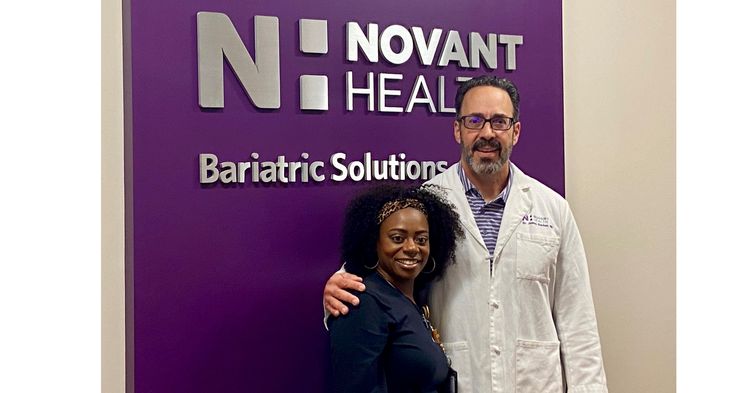Obesity is a life-threatening chronic disease. It’s generally not, as some still believe, the result of overeating and being sedentary.
That message is slowly trickling out to the public sphere. But there are still those who believe people with obesity should “just buckle down, exercise more and eat less,” said Dr. Neil McDevitt of Novant Health East Cooper Bariatric Surgery in Mount Pleasant, South Carolina.
In reality, it’s not that simple. Many with obesity suffer from a metabolic condition that prohibits them from achieving meaningful weight loss merely by changing their lifestyle, and have accompanying conditions, like painful arthritis, that make exercising difficult. For these individuals, bariatric surgery may be an option.
Personalized weight-loss programs to help you achieve a healthy lifestyle.
Bariatric surgery is an effective and sustainable treatment for obesity, medical studies show. Despite this, it remains underused, with only approximately 1% of all eligible patients nationwide undergoing the procedure. Bariatric surgery, like all weight-loss interventions, is neither quick nor easy. It requires an all-in commitment from the patient before surgery and (long) after. McDevitt tells people, “What we do is not for appearance; it’s for survival.”
We talked with McDevitt and three other bariatric surgeons – one from each of Novant Health’s regions – about what to expect before and after bariatric surgery.
What’s the biggest misconception about bariatric surgery?
That it’s the easy way out. There is, unfortunately, still a stigma about bariatric surgery we have yet to overcome.
Because GLP-1s (the class of drugs used to treat obesity and diabetes that are wildly popular now) are so effective, why should someone consider surgery? Isn’t a weekly injection easier?
Those drugs are very good tools in our arsenal, but the challenge is: We still aren’t sure about their long-term effects. And these are medications people may need to be on for a lifetime. They’re not an alternative to lifestyle modification.
I love pharmacotherapy as an alternative to surgery, however it must be used in conjunction with lifestyle changes. Bariatric surgery has a clear advantage over these medications, particularly in the treatment of type 2 diabetes: around 90% of diabetes goes into remission soon after surgery.
The surgery fundamentally alters hunger hormones and the way the body utilizes insulin and food.
Patients considering bariatric surgery generally need to lose 60, 100, 150 pounds. GLP-1s are designed for people who want to lose, maybe, up to 50 pounds. Surgery leads to faster and more sustainable results. And given the expense of the injectable medications – and the fact that people may need to be on them for a lifetime – surgery is generally the less expensive route over time.
How do you help ensure your patients’ success?
My patients taught me early on that the surgery we do is like changing tires. We have to fix the alignment at the same time – or they fail. And by that, I mean helping patients fundamentally change the way they think about food. They have to be able to sustain their weight loss.
We teach patients the difference between eating for nutrition and eating for other reasons such as boredom or stress. We see them monthly in preparation for surgery – for as long as they need us to. We won’t operate until they have a good handle on the dietary changes needed for long-term success.
They have to be motivated. The most motivated patients I see, typically, are those who’ve been told they have to lose weight before they can have a total knee or hip replacement. A highly motivated patient may be ready for surgery as soon as three months after their initial consult.
Not everyone is that eager. One patient was so reluctant that I worked with her for almost three years before her surgery.
My patients keep food journals and wear pedometers – and bring them both to their appointments. The numbers don't lie. If your goal is 5,000 steps a day, you’re either hitting that mark or you’re not. If you’re not, we’ll talk about why and find a way to increase that activity.
I remind patients that there’s no judgment in our office – ever. When I review a food journal, it’s not to judge but to get a window into their personal relationship with food.
What qualifications must be met to be a candidate for bariatric surgery?
Patients with a BMI of between 35 and 40 may be candidates if they suffer from weight-related medical conditions such as high blood pressure, diabetes or sleep apnea. (Click here for a BMI calculator.) Patients with a BMI of 40 or above may be candidates even without comorbidities. New criteria for surgery have been developed – but haven’t been adopted by insurance companies.
We now recognize that certain genetic factors make obesity more dangerous in some populations. Those of Asian descent with diabetes and a BMI of 27 or more are candidates for bariatric surgery.
Surgery is a long-term, effective way to lose weight and improve – or even eliminate – certain medical conditions. Even patients who are on dialysis for kidney failure are often recommended to have weight-loss surgery to qualify for a kidney transplant. For those patients, it’s the difference between being tied to a dialysis machine three times a week and regaining their independence.
Age, of course, is considered, but it’s just one of many factors reviewed when considering if surgery is appropriate.
What are some obstacles to receiving bariatric surgery?
The biggest reason we see for a patient’s reluctance to have surgery is lack of family support. Without that, lifestyle changes may be next-to-impossible. Most of my patients with obesity are so busy caring for everyone else’s needs that they neglect their health. I help them recognize their own value.
Our views on food are so deeply entrenched that when somebody changes the music, not everybody knows how to dance to it. It’s hard when one family member – especially if it’s the person responsible for preparing meals – wants to start eating differently.
While family support is important, there are other places patients can seek support, including through online support groups. There’s a large community of bariatric patients, and social media is a good place to find them.
Editor’s note: Sometimes, surgeons operate on family members – spouses, siblings – at the same time. Going through a major life change with a family member helps with accountability.
Is surgery right for everyone? If not, who’s it not right for?
Almost all patients who qualify for bariatric surgery would benefit from the health benefits it offers. However, patients must be ready to commit to the lifestyle changes that will ultimately help them achieve the best possible results.
All patients must undergo mandatory psychological testing to ensure that unmanaged psychiatric conditions would not prevent them from being successful after surgery. It’s mandatory that patients are not smoking, as this can lead to adverse events and outcomes from surgery. Patients must also be compliant with long-term, follow-up care; their care team should monitor their health and nutrition each year. Besides this, many patients – even with significant health conditions including heart and kidney failure – may still qualify and achieve significant benefits from surgery.
Bariatric surgery is not just about weight loss. If a patient comes to you simply wanting to be thinner, what do you say?
Top scores for safety in NC
Novant Health received the most ‘As’ for patient safety in North Carolina from The Leapfrog Group. With a focus on safety, quality and patient experience, the national, industry-leading nonprofit, evaluates and assigns letter grades ranging from A to F to hospitals across the country. Novant Health’s hospitals with “A” grades outperform 70% of hospitals nationwide for safety and quality.
For many patients we see, the expected health benefits are a significant reason they choose to pursue surgery. However, some patients may be relatively healthy with few other medical conditions and are primarily interested in weight loss.
Studies have shown that, for patients who qualify based on weight alone, having bariatric surgery will make them less likely to develop the medical conditions associated with metabolic syndrome – diabetes, high blood pressure, high cholesterol and sleep apnea.
It’s also been shown to lower the incidence of cardiovascular disease and certain types of cancers including breast, endometrial and colorectal. Altogether, this explains why research has shown that patients who undergo bariatric surgery have a longer life expectancy compared to similar patients who do not.
It is for these reasons that, if a patient is committed and meets all the criteria, bariatric surgery is probably one of the best decisions they can make for their long-term health.
What other health conditions does bariatric surgery address?
Aside from the commonly discussed health conditions such as diabetes, high blood pressure, cardiovascular disease, sleep apnea and acid reflux, there are other, lesser-known conditions for which bariatric surgery has been shown to be the most effective treatment. They include polycystic ovarian syndrome, certain skin conditions and an increasingly important one – nonalcoholic fatty liver disease.
This is a growing cause of liver failure and indication for liver transplants in the United States, and is harder to diagnose because there are fewer tests readily available. This may allow it to go undiagnosed until someone develops significant liver disease. Bariatric surgery has been shown to be the only effective way to halt the progression of fatty liver disease – and even reverse it.
What about insurance approval?
If a patient qualifies for bariatric surgery, most insurance plans will cover it. There are certain requirements – meeting with a dietitian and having a psychological evaluation – to complete before insurance approval. While this may seem daunting for patients, our office helps them navigate the process.
How does bariatric surgery work?
These surgeries work by restriction — making the stomach smaller so that patients feel full sooner and eat less. In cases where a bypass is performed, patients absorb fewer calories, because the food they digest bypasses most of the stomach and the upper small intestine.
Additionally, and importantly, brain signaling is changed — either by decreasing the production of hunger factors or by decreasing the brain’s hunger response.
What types of bariatric surgery are there?
Our two most common procedures are the sleeve gastrectomy and the gastric bypass. The “sleeve” is currently the most dominant bariatric procedure and an operation in which we take out most of the stomach and some of the hunger factor production.
Then there’s gastric bypass – a procedure that involves sealing off a small portion of the upper stomach and connecting it to the small intestine. Gastric bypass also causes hormonal changes to the brain that improve hunger control and satiety.
We can also perform a sleeve gastric bypass, also known as One Anastomosis Gastric Bypass (OAGB), which is a modification of both sleeve and gastric bypass or a Single Anastomosis Duodeno-ileal Bypass with Sleeve gastrectomy (SADI-S) which is basically a “sleeve” with a very long bypass.
All these procedures can be performed laparoscopically with very small incisions with or without robotic assistance and require an overnight hospital stay with one to two weeks of recovery.
When we first meet with a patient, we’ll review their medical conditions, consider their weight and discuss their options. If someone just barely meets the criteria and doesn't have other medical conditions, I might recommend one procedure. But someone who’s significantly overweight and has other medical conditions might do better with a different procedure. This all very individualized.
Regardless of which surgery a patient chooses, most lose 20% to 25% of their body weight in the first 12 weeks after surgery. Six to eight months after surgery, most have lost 60% to 75% of their pre-op weight.
Surgery alone doesn’t “fix” obesity. Patients must make a lifetime commitment to better health, right?
If a patient has surgery and doesn’t change their lifestyle, regaining weight is likely.
When bariatric surgery was new, many surgeons would operate, see the patient for a follow-up and wish them luck. We’ve done things differently at our practice. At Novant Health Bariatric Solutions - Kernersville, we see patients a week after surgery and again at the two-month, six-month and one-year mark. We do labs at the six-month and one-year mark.
We want to see patients once a year forever. We feel like, since we’re asking patients to make a lasting change to their lifestyle, we had better be available to them for a lifetime, too.
What foods do you recommend following surgery?
After surgery, there’s a dietary progression. It’s strictly liquids at first and then purees, soft food and finally solid food.Patients need to stick to a high-protein diet and stay active. That ought to include weight training, which leads to your body burning fat at a much higher rate. We don't want patients to get smaller but have no energy.
Good proteins and green, leafy vegetables are part of the program. Some fruits – like berries – are good choices, but really sweet fruits like pineapple, grapes and bananas should be eaten in moderation. They should aim for eight glasses of water a day.
We coach patients to listen to their bodies. They will get full faster than before – sometimes after only a few bites.

Contact weight loss services
Need more information or to request an appointment? We're here to help.

















